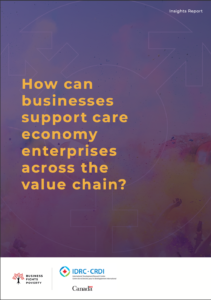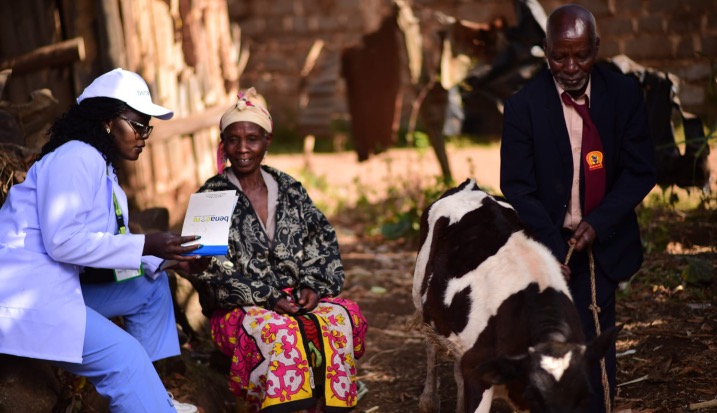
The interviews with five Business Fights Poverty Lead Partners, Primark, Unilever, Anglo American, Standard Chartered and Mastercard Center for Inclusive Growth, focussed on two areas. Firstly, how their companies are currently supporting social entrepreneurs and secondly if and how their companies are addressing the care economy through workplace policies.
These lines of questioning led to 4 overarching insights:
- Companies need to better understand how care impacts their business
- Workplace policies can offer a springboard to engage with care enterprises (e.g. responsible recruitment of domestic workers, responsible sourcing of cleaning services)
- Companies with extensive supply chains could help enterprises achieve scale (companies can be a bridge essentially linking their workers with social enterprises to help them access low cost, quality care services)
- Philanthropic entrepreneurship programmes could be more focussed on supporting care enterprises.

INTERVIEW WITH ZAHEERA SOOMAR, HEAD OF EDUCATION AND COMMUNITYSKILLS, STRATEGY AND SUSTAINABILITY AT ANGLO AMERICAN
Why is social innovation important to Anglo American?
Mining has historically been understood as destructive to the environment and to society. We are working hard to resolve this, going beyond the traditional sticking plaster of CSR, (which for me is more about compliance and PR and ensuring your licence to operate) to really break the cycles of entrenched social ills in the places where we work. Not just solving for today but for the long term – this means you have to be socially innovative. It’s not ok to do the same and think it will get different results.
Why the particular focus on early years development?
For us early years is ‘the’ entry point that can help break cycles of poverty. If we really want to improve things for the long term, you have to address the root causes. A lot of the social ills related to employment and skills, start in the early years such as stunted growth, nutrition, literacy and numeracy. In addition, decent education provision in remote rural areas where we operate is also of vital importance when it comes to recruiting people to work at the mines and early years development centres provide childcare support for working parents too. We assess employees and check they have adequate provision and look to assist with needs, where we can assist with additional capacity, after care programmes and parental support.
In our education programmes, we focus on 3-5 year olds and work with local NGOs to strengthen state provided early years education centres (ECDs). In South Africa we support ~200 ECDs in Limpopo, Northern Cape and the NW region. One of our goals is to help turn these centres from under resourced day care facilities into quality early years learning centres. We focus on three main things, infrastructure – ensuring the spaces are safe and have play equipment. Nutrition – ensuring a focus on balanced diets, and training and skilling staff with educational resources, knowledge, skills and tools.
Do you work with entrepreneurs to deliver this work?
We work with a variety of providers including entrepreneurs to deliver on our programmes. Many of our schools are in rural areas, and it’s important for us that we involve the local community and help build the local community through this work, in order to really generate sustainability. This means including local people in the work that we do.
We tend to work with various NGOS in each country – some small and some large. But we really aim to ensure local empowerment is achieved and this means supporting the small local entrepreneurs who are able to deliver our programme, or help them build capacity in order to work with us.
Anglo American also runs an enterprise programme – tell us a little more about that and how these enterprises link to your operations?
Yes, we have a programme on enterprise development – this is really focussed on building thriving economies in and around the areas where we work. Through the Zimele programme we provide skills training, support with accessing loans and capital. For us it’s doing two things – both building local revenue streams and growing our local procurement options. So when I want to hire a service provider for one of our education programs I can find someone locally. For example – one woman who participated in the enterprise programme set up a business that used waste from the mine to design and create a recyclable green brick for infrastructure projects. We recruited her services and used her bricks to build school classrooms. In another case – an entrepreneur started a nutrition business – food gardens – and we purchase these food garden packs to both setup food gardens at schools but also in households. This helps drive nutrition at home and school, save costs in the home, and drive revenue in the school.
How does Anglo American currently support its employees to balance work and caring responsibilities in the workplace?
A variety of things are available depending on which Business Unit, or country you are in. At the Group level we get generous leave – including compassion and other types of leave. We have a very strong flexible and remote working policy, so people can work from home. And shared parental leave policies. At the site level we tend to provide housing and school fees for employees with kids. As mentioned earlier we also seek to strengthen the educational and economic ecosystems around our mining sites including the provision of early years and afterschool care.
Could you envisage Anglo American supporting entrepreneurs that are part of the care economy?
Yes – we have an interest in building thriving communities – whether it benefits Anglo or not. We are always looking for ways to equip employees and host communities with what they need to manage things at home – whether its electricity or internet connectivity to enable more learning to take place at home, or providing more parenting tools and resources on nutrition or mental health so they can support children at all stages of their development. For example we are building up a sort of network to train parents on a package of ‘after school care’ covering mental and emotional wellbeing, tuition skills etc. Once trained they too will be able to offer these services as a business.
Anglo American’s enterprise programme Zimele
READ MORE INTERVIEWS FROM THIS SERIES:










